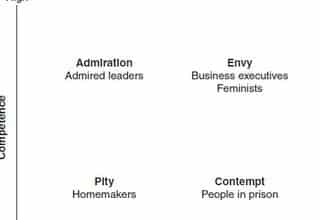When I’m coaching leaders, there’s typically a point when they get frustrated and say, “Why do you keep asking me about the past?” They don’t want to talk about previous jobs or companies; they are laser-focused on the problems of today. It only takes one or two examples of patterns in their work history before they understand that the answers to many of their difficulties can be solved by exploring their prototypical behavior. Dave Grohl figured this out long ago.
Dave Grohl is the frontman for one of today’s greatest rock bands, the Foo Fighters. While you can accredit their success to 20+ years of consistently stellar music, there is more to it. Grohl initially gained international fame as the drummer for Nirvana. When the band abruptly ended in 1994, he reflected on the experience and used it to form the Foo Fighters.
‘When the Foo Fighters started, we made some pretty clear decisions about what to do and what not to do.’ On the to-do list? ‘Go out and play some shows. Start from the ground up.’ And the not-to-do list? Grohl laughs ruefully. ‘I mean…heroin?’—from an interview with Rolling Stones’ Josh Eells
The following are three things Grohl learned through his stint with Nirvana. All three have benefited Foo and are valuable insights for any leader. But be mindful that none of them would have been possible if Grohl hadn’t examined his past and made a concerted efforted to not repeat mistakes.
Gradual Growth
Grohl once called his time with Nirvana “a crash course in the danger of a band becoming so popular so quickly.” As a result, he and the Foos made a conscious effort to expand purposefully. Instead of immediately trying to fill stadium, they concentrated on churning out quality albums every two to three years.
The success the band’s had, we’ve been able to grow with it over time. It never overwhelmed us.—Nate Mendel, Foo’s bassist
For anyone new to their enhanced level of success, there’s a desperate, insatiable hunger to get as much as you can, as soon as you can. In the process, people lose their moral compass and flounder in chaos. When/If they regain mindfulness, their life in unrecognizable…and not in a good way. If you are willing to learn from Nirvana, you can avoid this misstep. Like Grohl’s second go-around, plot intentionally, grow progressively, and assess frequently.
Equal Footing
One of Grohl’s signature tenets is to ensure that the Foos never feel like a backing band. For instance, unlike Nirvana where Kurt Cobain renegotiated contracts to retroactively give himself a bigger share of the profits, the Foos own all publishing revenue equally. In addition, Grohl seeks feedback and avoids the feeling that it’s “Dave Grohl and the Foo Fighters.”
He was a f–king drummer, man! I think because he was in that back seat, he knows how we’d feel if we were treated badly.—Taylor Hawkins, Foo’s drummer
While you are in charge, there’s no need making everyone else feel like subordinates. The best leaders lead from a place of egalitarianism, we did it together” versus “I did it with a little help.” This attitude builds empowerment, ownership, engagement, and loyalty. You also get a better work product.
Benign Dictatorship
Though the Foos are on equal footing, there is correspondingly no question about who sits in the leader seat. “I know at the end of the day it’s my name at the bottom of the check,” Grohl says. “But we all hold different responsibilities that keep the thing f–king going.”
This band works because it’s not a democracy. People can read into that what they want but it’s a big reason why the band hasn’t broken up.—Chris Shiflett, Foo’s lead guitarist
I like that term “benign dictatorship.” It came from Taylor Hawkins describing Grohl and it’s the perfect way to describe an ideal leader. These leaders are the boss, everyone knows they are the boss, but they don’t compromise their boss-ness by treating others with disrespect or callousness.
Grohl laid the groundwork for a successful band that has more than exceeded the accomplishments of their counterparts. To do so, he recognized past mistakes and vowed to do better. When you think about your past experiences, what lessons can you pull to ensure the success of your next endeavor? What has worked for you? What hasn’t? If you can answer these questions, create a plan, and stick with it, you may end up with your own band of Foos.








